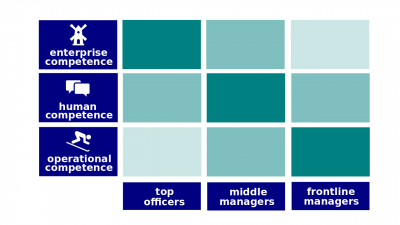Difference between revisions of "Administrative competence"
(→Components) |
|||
| Line 1: | Line 1: | ||
| − | [[File:Administrative-competence.png|400px|thumb|right|[[Administrative competence]]]][[Administrative competence]] (alternatively known as [[managerial skills]]; hereinafter, the ''Competence'') is [[competence]] needed to undertake [[enterprise effort]]s. | + | [[File:Administrative-competence.png|400px|thumb|right|[[Administrative competence]]]][[Administrative competence]] (alternatively known as [[managerial skills]]; hereinafter, the ''Competence'') is [[competence]] needed to undertake [[enterprise effort]]s conceptually, regardless of specific [[industry]] or [[occupation]]. |
| + | |||
==Components== | ==Components== | ||
Revision as of 05:39, 11 October 2020
Administrative competence (alternatively known as managerial skills; hereinafter, the Competence) is competence needed to undertake enterprise efforts conceptually, regardless of specific industry or occupation.
Components
- Operational competence (technical competence, technical skills). Knowledge, skills, and abilities needed to perform the most of jobs. That competence includes capacity to read, write, analyze, use computers, etc.
- Interpersonal competence (human competence, interpersonal skills, people skills). Knowledge, skills, and abilities needed to work with other people individually and in a group. That competence includes capacity to listen actively, communicate, understand other's motivation, etc.
- Enterprise competence (organizational competence, organizational skills, conceptual competence). Knowledge, skills, and abilities needed to undertake enterprise efforts as well as to work in and with enterprises. That competence includes capacity (a) to navigate organizations and bureaucracies, (b) to plan and allocate resources, (c) to research for data, (d) to execute regulatory compliance, (e) to market, (f) to make decisions, etc.
Related concepts
- Competence. The ability to do something successfully or efficiently.
